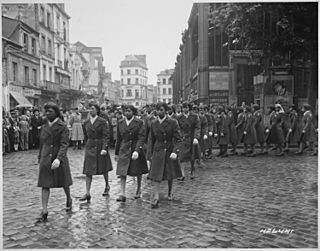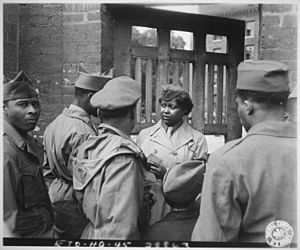6888th Central Postal Directory Battalion facts for kids
Quick facts for kids 6888th Central Postal Battalion |
|
|---|---|

Members of the 6888th Central Postal Directory Battalion take part in a May 1945 parade ceremony in honor of Joan d'Arc at the marketplace where she was burned at the stake
|
|
| Active | 1945–1946 |
| Country | United States |
| Branch | US Army |
| Role | Postal service |
| Part of | Women's Army Corps |
| Nickname(s) | Six Triple Eight |
| Motto(s) | No mail, low morale |
| Commanders | |
| Current commander |
Major Charity Adams |
The 6888th Central Postal Directory Battalion, also known as the "Six Triple Eight", was a special group of women. It was made up entirely of black women from the Women's Army Corps (WAC). This battalion had 855 black women, including both soldiers and officers. It was led by Major Charity Adams. The 6888th was the only all-black, all-female military group sent overseas during World War II. Their motto was "No mail, low morale," because they knew how important letters were for soldiers far from home.
The battalion was split into five smaller groups: Headquarters, Company A, Company B, Company C, and Company D. Most of the women worked as postal clerks, sorting mail. But others were cooks, mechanics, and held other jobs. This made the 6888th a team that could take care of itself.
Contents
History
During World War II, there was a big problem with mail for American soldiers overseas. Many letters and packages were stuck and not being delivered. In 1944, Mary McLeod Bethune worked to get support from the First Lady, Eleanor Roosevelt. They wanted black women to have important jobs in the war overseas. Black newspapers also pushed the U.S. Army to use black women in meaningful roles.
The women who joined the 6888th went through basic training in Georgia. Some women, like Alyce Dixon, were already in the WAC. They had served in places like the Pentagon before joining this special battalion.
Great Britain
The 6888th left the United States on February 3, 1945. They sailed on a ship called the Île de France. On their trip, the ship had to avoid several German U-boats (submarines). They arrived safely in Glasgow, Scotland, on February 14. From there, they traveled by train to Birmingham, England.
When the 6888th arrived in Birmingham, they saw a huge problem. Letters were piled up to the ceiling in the temporary post office. Some mail had been sitting there for as long as two years. Army leaders knew that undelivered mail made soldiers feel sad and lonely. Many letters had only a first name or a nickname, making them hard to deliver. There were about 17 million pieces of mail waiting to be sorted.
Early on, a white general tried to send a white officer to tell the women how to do their job. But Major Adams bravely said, "Sir, over my dead body, sir!" The battalion was supposed to take six months to clear the mail. Instead, they finished the huge task in just three months, by May 1945.
The 6888th created their own smart system to handle the mail. They made a giant card index with names of soldiers. This helped them tell apart people with the same or similar names. This index eventually had 7 million cards! The women worked in three different shifts, seven days a week. They processed and delivered mail to soldiers in Europe. Each shift handled about 65,000 pieces of mail. In total, they managed mail for over four million soldiers and civilians. They cleared backlogs in both the UK and France.
The 6888th was a segregated unit. This meant they had to sleep and eat in different places from white male soldiers. They lived and worked in a former school building. Officers stayed in houses nearby. Some of the women felt that people in Europe treated them better than people did in the United States. However, they sometimes faced unfair treatment from male soldiers. The buildings were poorly heated, so the women had to wear warm coats while working.
A chaplain in Birmingham caused problems for Major Adams. He told her soldiers not to go to work, but to report to his office instead. This made them seem absent without leave (AWOL). Major Adams had to talk to him and remind him that she was in charge of her women's duties.
France
After clearing the mail in Birmingham, the 6888th moved to Le Havre, France, in May 1945. Then they went by train to Rouen. There, they found another huge pile of mail, some of it three years old. The military police in the WAC unit were not allowed to carry weapons. So, they used jujitsu to keep unwanted visitors away. The women also took part in a parade ceremony in Rouen. It was held at the place where Joan of Arc was executed.
By October 1945, the mail in Rouen was cleared. The 6888th then moved to Paris. They marched through the city and stayed in a fancy hotel. They received excellent treatment there. Because the war was over, the battalion was made smaller. About 300 women left, and another 200 were set to leave in January 1946.
Post-war
In February 1946, the unit returned to the United States. They were officially disbanded at Fort Dix, New Jersey. At that time, their amazing service was not publicly recognized.
Legacy
Members of the 6888th Central Postal Directory Battalion received several awards for their service. These included the European-African-Middle Eastern Campaign Medal, the Good Conduct Medal, and the World War II Victory Medal.
On February 25, 2009, the battalion was honored at the Women in Military Service for America Memorial. This memorial is located at Arlington National Cemetery. Three former members of the 6888th attended the event: Alyce Dixon, Mary Ragland, and Gladys Shuster Carter. Alyce Dixon and Mary Ragland were also honored by President Barack Obama and First Lady Michelle Obama in 2009.
On March 15, 2016, the 6888th Central Postal Directory Battalion was added to the U.S. Army Women's Foundation Hall of Fame. Elsie Garris, a veteran from the battalion, was there for the ceremony.
On November 30, 2018, Fort Leavenworth dedicated a monument to the women of the 6888th. Five women from the battalion were present: Maybeel Campbell, Elizabeth Johnson, Lena King, Anna Robertson, and Deloris Ruddock.
On February 12, 2021, U.S. Senators Jerry Moran and Jacky Rosen worked together to propose a law. This law would give the Congressional Gold Medal to the members of the 6888th Battalion. U.S. Representative Gwen Moore introduced a similar law in the House of Representatives. On March 14, 2022, President Joe Biden signed a law to award the battalion the Congressional Gold Medal. This is one of the highest awards a civilian can receive in the United States.
As of 2022, only six members of the 6888th are still alive:
- Romay Davis
- Cresencia Garcia[1]
- Fannie McClendon[2]
- Gladys E. Blount[3]
- Lena King[4]
- Anna Mae Robertson[5]
 | Madam C. J. Walker |
 | Janet Emerson Bashen |
 | Annie Turnbo Malone |
 | Maggie L. Walker |


